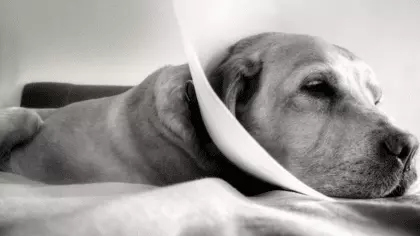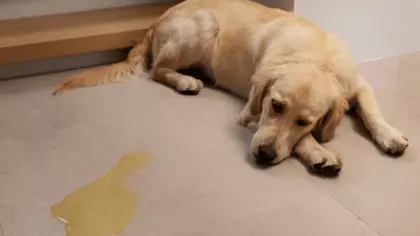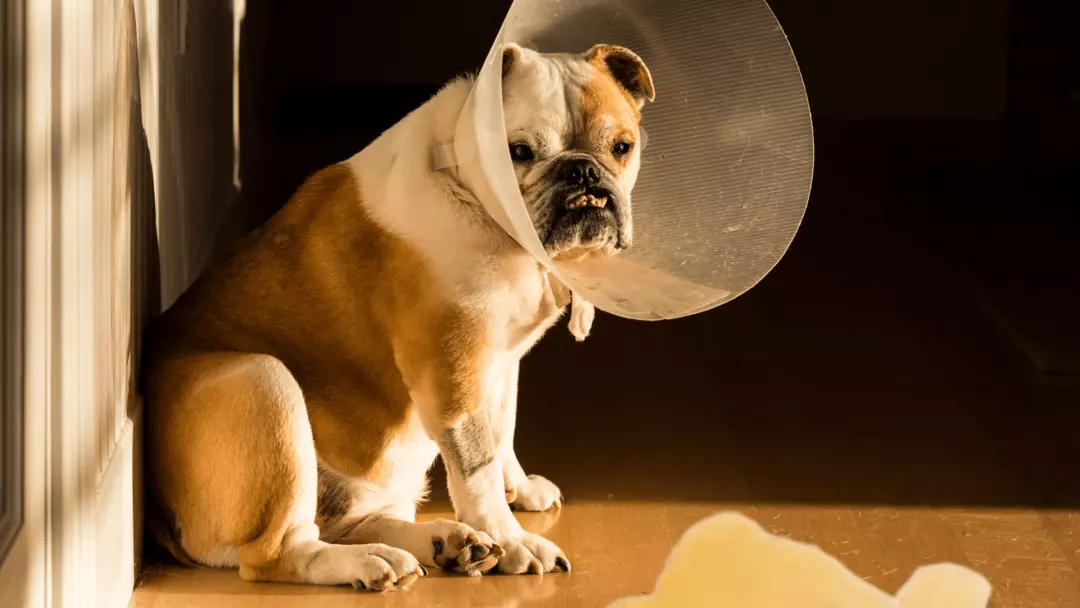Are you tired of cleaning the house or surrounding area after taking the dog back to the house from neutering or spaying? Wondering why is my dog having accidents after being neutered? Don’t know how to control or prevent it?
Typically, dogs can have frequent accidents after being neutered due to urinary incontinence, or UTI, become groggy; feel pain; or drink lots of water. Though you can’t prevent this behavior completely, read on to learn about some safe attempts to control it and help your dog recovers quickly.
Also Read: Can A Dog Still Produce Sperm After Being Neutered
Why is My Dog Having Accidents after Being Neutered?

In general, neutered dogs don’t pee more frequently or in larger amounts than intact dogs. But if your neutered dog has accidents, it means she is suffering from spay incontinence, and it isn’t an uncommon occurrence. Though your dog should feel pretty good after six days, it can take a month or two.
There could be plenty of reasons why your neutered dog is constantly peeing, including a urinary tract infection, feeling stressed or anxious, or having a medical condition. A neutered dog may also pee frequently to mark the territory. Let’s discuss briefly:
Urinary Incontinence
It’s the most likely reason that may cause your dog to have accidents after spaying or neutering. The hormones of a dog change immediately after neutering, which loosens the muscles, causes hormonal imbalances, and eventually causes the urine to drip.
The normal function of the dog’s urinary tract tissue is dependent on adequate estrogen hormone exposure. But after removing the ovaries of a dog, their estrogen level drops. Hence, estrogen’s scarcity relaxes the urethral sphincter and releases urine more often.
Become Groggy
One of the more serious surgeries for a dog that causes grogginess is neutering. In addition, the dog can become too groggy if brought home quickly after surgery. Hence, your pooch can have a hard time walking or going to the toilet without urinating frequently.
Feeling Pain
Along with becoming groggy, a neutered dog also feels pain. In most cases, the neutered dog is kept in the clinic overnight and sent back home in the early morning. So the dog might feel pain and become unable to attend to the bladder and bowel.
Therefore, many vets send the neutered dog home along with pain medications to accelerate recovery. Still, some dogs can pee more often, especially if they don’t get pain medications.
Dog Drank Lots of Water
In most cases, the dog drinks ample water after having surgery. It’s particularly true for a groggy dog or a dog that is in pain. Due to drinking water excessively, your neutered dog can pee frequently. In addition, the neutered dog also vomited after surgery due to drinking lots of water. In this case, you should limit the water consumption of your dog to avoid causing an accident.
Urinary Tract Infection
While recovering from neutering, your dog may hold urine for a long time, which can cause a urinary tract infection (UTI). As a result, bacteria can affect your dog’s health and cause frequent urination. Another reason is that the urethra relaxes when the dog is anesthetized, which encourages bacteria to travel up and cause an infection.
If your dog suffers from an UTI, it may discharge urine frequently. Apart from releasing a few drops of urine, your pooch may also squat more often. If this is the case, you may also notice blood in the urine. To relieve this, you may need to give antibiotics to your pooch for a few weeks, following the vet’s suggestion.
Is It Normal for Dogs to Have Accidents after Surgery?
In most cases, peeing frequently is normal for a neutered dog. The dog may urinate more than usual for the first 24 to 48 hours after neutering as they receive IV fluid when staying in the hospital. Clear, normal-looking urine and comfortable urinating are also clear signs of normal behavior.
Some dogs also get anesthesia after surgery, which increases urination. In this case, the vet will inform you whether it is expected or unusual. Dogs’ urination can also increase if they experience difficulty during the anesthetic process. Apart from peeing frequently, a neutered dog can also release less urine, which is also normal in some cases.
After neutering, the blood pressure of the dog drops, which decreases the blood flow to the kidneys and affects the kidney’s functionality, and ends up decreasing urination. Some potential illnesses include vomiting, nausea, reduced appetite, or lethargy.
Your vet should tell you whether peeing frequently is concerning or not, as well as whether it requires monitoring or not. If your dog has more or less had an accident after 24 hours of coming back home and shows other signs of illness, talk to your veterinarian.
Also Read: How Long After Drinking Water Do Puppies Pee
How long does Dog Incontinence Last after Surgery?
Your dog’s incontinence can last for around 1 to 2 weeks after surgery. If your pooch has an accident in the house, you can’t prevent her during recovery time, so have patience. During this time, your female dog will be able to attract male dogs through scent.
After recovering, your female pet’s hormones will decrease. For your male dog, it may take around 6 weeks to get the balance back after being spayed. During this period, your male dog will display full testosterone behavior.
Also Read: How Long After Being Spayed Can My Dog Jump?
Fixing Urinary Incontinence of Neutered Dogs

In most cases, it should become normal on its own. Six days isn’t too long, and you should be patient with your beloved pet, particularly when it’s healing. However, the steps you can take to keep the house clean are:
Use accessories
You can give belly bands and diapers to your dog. Doggie diapers can also help keep rugs clean and dry. In addition, keep the neutered dog’s skin and surrounding area clean and dry so your dog doesn’t get an injury due to urine.
To avoid messes, if your dog has long hair, trim it or sanitary trim it. You can also place waterproof pads under the dog’s bedding to maintain a proper hygiene environment and avoid skin infections.
Medication
After determining your dog’s incontinence, the vet should recommend a treatment plan. The most common treatment is a regular medication, which is almost 95% effective and can fix the urine leakage in most dogs effectively.
However, some dogs don’t respond to medication fully, and they may require advanced non-surgical and surgical procedures for dog continence. For safer suggestions, you should consult with a vet who is an expert in urinary system disorders.
Be Careful about Consumption
Since drinking lots of water is a key reason for peeing frequently, limiting drinking can help control this problem. After drinking water, encourage your dog to walk to empty the bladder. If your neutered dog is unable to go outside, use a pee pad in the house. In addition, mix red raspberry leaf tea into his food to clean out the system.
Sometimes extra vitamin C or cranberry supplements can also acidify the urine to help a bit. However, these supplements can worsen the situation, so talk to your vet before adding them.
Limit the Movement
As your dog recovers from major surgery, it’s safer to limit their movement to keep the house clean while giving them ample rest. This will also help prevent putting extra pressure on their health, which may occur when giving medication.
To do so, you can avoid letting them go to the upstairs, the utility room, or other preferred areas. In addition, you can use a crate or X-pen. The best thing to do is to get your pooch neutered earlier instead of later, as it is a learned behavior.
Visit a Vet
Urinary incontinence can cause infections over time. so monitor your dog’s condition carefully and consult your veterinarian for treatment plans.
While revisiting the vet’s office with the dog, get a history, do some urinalysis, and other related tests to find out if there is a medical issue. If the vet marks it as before, it will take longer than six days for your dog’s hormone level to drop. In addition, keep checking the dog, particularly if she urinates in the home.
FAQs
1. Why does a dog pee himself after being neutered?
Your dog may pee himself after being neutered due to hormone-responsive incontinence. Both male and female dogs can suffer from this problem for up to six months. During this period, your dog may leak urine while resting, and you may find them wet.
2. What behaviors change when a dog is neutered?
Along with changes in urination, you can notice plenty of changes in their behavior. The change in behavior includes escaping to seek female dogs, urine marking, and aggression toward other male dogs.
3. Do dogs regress after neutering?
Some dogs can get depressed during the neutering procedure. But this feeling is self-limiting and linked with pain and stress. However, dogs get relief from depression a day or two after the procedure.
Also Read: How Long Does a Male Dog Have to Wear the Cone After Neutering
Final Words
In the end, you should have enough reasons for why is my dog having accidents after being neutered. In this case, apply positive reinforcement by making the dog feels comfortable, giving it proper food and enough water, and preventing it from doing any exercise. Instead of giving medication in the first place, concentrate on their comfort and happiness, even if it becomes tiresome for you. After coming home from surgery, your dog will act, look, and smell differently, so don’t panic.
